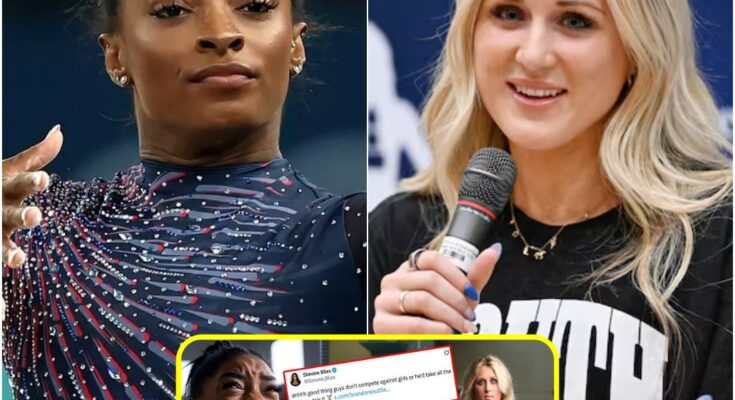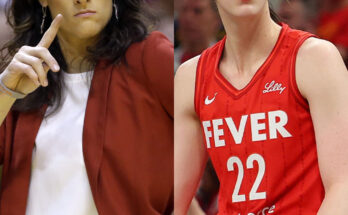In the world of sports, controversy is never far away. But when it involves two of the most outspoken figures in the debate over transgender athletes in women’s sports—Olympic gold medalist Simone Biles and former college swimmer Riley Gaines—the fireworks are almost guaranteed. This week, a digital time capsule from 2017 came back to haunt Biles, reigniting a culture war that shows no sign of cooling down.
The Spark: Biles vs. Gaines
:max_bytes(150000):strip_icc():focal(728x551:730x553)/Simone-Biles-and-Riley-Gaines-clash-060725-2-be6722a71bf34f16a845b4e9b67f98e1.jpg)
It all began with a heated exchange on social media. Riley Gaines, now a prominent women’s rights advocate, called out the Minnesota State High School League on X (formerly Twitter) for not allowing comments on a post about a girls’ softball team’s state championship win. The controversy? The team’s star pitcher, according to Gaines and various outlets, was a biological male identifying as female.
Simone Biles—one of the most decorated athletes in gymnastics history—jumped into the fray. She rebuked Gaines, suggesting she should “uplift the trans community” and consider new avenues for trans inclusion in sports. Biles’ comments were blunt: “You’re truly sick. All this campaigning because you lost a race… No one is safe in sports with Riley Gaines around.”
The backlash was immediate and intense. Critics accused Biles of “body shaming” and betraying the women’s sports movement. But the story didn’t end there.
The Internet Never Forgets
As Biles’ comments continued to trend, internet sleuths began digging through her social media history. What they found was a tweet from October 2017 that seemed to contradict her current stance. The tweet read:
“Ah, good thing guys don’t compete against girls or he’d take all the gold medals.”
The context of the tweet is now lost to a dead link, but its message was clear: Biles once acknowledged the physical differences between male and female athletes and implied that allowing men to compete against women would be unfair.
Riley Gaines seized on the moment, reposting the tweet with a pointed caption: “Oop, don’t you hate it when your past self completely undermines your current nonsensical argument?” Others quickly joined in, accusing Biles of hypocrisy and “virtue signaling” for political points.
Social Media “Cooking”
The phrase “Simone Biles is getting cooked” echoed across YouTube, X, and TikTok as critics piled on.
“You used to be sane,” wrote one commenter.
“Your hypocrisy is showing,” said another.
A third quipped, “Simone Biles, meet Simone Biles.”
Seth Dillon, CEO of the satirical site Babylon Bee, even chimed in: “You used to be sane.” The consensus among critics was that Biles’ current support for trans inclusion in women’s sports was performative, inauthentic, and at odds with her past beliefs.
The Broader Divide
This wasn’t just about a single tweet. The debate over transgender participation in women’s sports has become a defining culture war issue in America, cutting across political lines. Even some lifelong liberals, like tennis legend Martina Navratilova, have sided with Gaines and others who argue for protecting women’s sports from what they see as unfair competition.
The transcript’s host points out, “This is really a 90/10 issue. Democrats don’t even want these men in women’s sports. They don’t.” He references the Minnesota championship, where even Democratic protesters reportedly objected to the inclusion of a biological male on the girls’ team.
“Virtue Signal” or Genuine Belief?
To Biles’ critics, her current advocacy is little more than virtue signaling—a performance for social media rather than a reflection of deeply held beliefs. “She truly doesn’t believe in this stuff,” the host insists. “Simone Biles doesn’t have to participate in sports against these males… When they try to actually do male gymnastics, that’s on another level.”
To illustrate the point, the host references a viral video comparing a male gymnast’s performance to Biles attempting the same routine. The implication: even the world’s greatest female gymnast struggles to match the physicality of her male counterparts, reinforcing the argument that women’s sports deserve protection.
The Personal Becomes Political
Biles’ critics didn’t stop at her athleticism. They questioned her motives, her marriage to NFL player Jonathan Owens, and her willingness to defend her stance in public. “I’m pretty sure, man, when he shows up to camp, if this thing is still out there, he’s going to get cooked in the locker room,” the host speculated, suggesting that even professional athletes are skeptical of men competing in women’s sports.
The tone grew even more personal, with accusations that Biles had “sold out females to the left” and was now a “pro-leist”—someone who supports progressive causes at the expense of traditional values.
Riley Gaines: “Cooking” Her Opponent
Throughout the controversy, Riley Gaines remained unapologetic. She reposted Biles’ 2017 tweet, mocked her for flip-flopping, and doubled down on her message that women’s sports must be protected. To her supporters, Gaines “cooked” Biles—publicly exposing her contradictions and positioning herself as the true defender of women’s athletics.
The Culture War Continues
As the dust settles, the feud between Simone Biles and Riley Gaines is more than just a personal spat. It’s a microcosm of the broader struggle over the future of sports, fairness, and identity in America.
For Biles, the episode is a cautionary tale about the permanence of social media and the dangers of changing one’s public stance in a polarized environment. For Gaines, it’s another opportunity to rally her base and push for policies that restrict transgender participation in women’s sports.
For everyone else, it’s a reminder that in the age of the internet, the past is never truly past—and every tweet, no matter how old, can become the battleground for today’s fiercest debates.
Simone Biles blasts ‘truly sick’ Riley Gaines over swimmer’s mockery of 17-year-old trans athlete
Simone Biles blasts ‘truly sick’ Riley Gaines over swimmer’s mockery of 17-year-old trans athlete
Olympic champion Simone Biles eviscerated former college swimmer Riley Gaines over her “sick” online comments about a transgender female softball player.
Gaines, a vocal Donald Trump supporter who is known for campaigning against trans athletes in women’s sports, had mocked the Minnesota State High School League for removing comments on their post about the Chaplin Park girls’ team celebrating the State Championship.
“To be expected when your star player is a boy,” Gaines wrote on X of 17-year-old pitcher Marissa Rothenberger, who threw a complete-game shutout, allowing just three hits and striking out six to secure the title.
Seven-time Olympic gold medalist Biles responded to Gaines’s tweet on Friday, writing: “You’re truly sick, all of this campaigning because you lost a race.”
Gaines tied for fifth place with transgender woman Lia Thomas in the 200m freestyle swimming at the 2022 NCAA Championships.
Simone Biles (left) and Riley Gaines (Getty Images)
“Straight up sore loser,” Biles continued. “You should be uplifting the trans community and perhaps finding a way to make sports inclusive OR creating a new avenue where trans feel safe in sports. Maybe a transgender category IN ALL sports!! But instead… You bully them… One things for sure is no one in sports is safe with you around!!!!!”
“Bully someone your own size, which would ironically be a male,” Biles added in a separate post.
Gaines quickly shot back, writing: “This is actually so disappointing. It’s not my job or the job of any woman to figure out how to include men in our spaces. You can uplift men stealing championships in women’s sports with YOUR platform. Men don’t belong in women’s sports and I say that with my full chest.”
Biles called Gaines a ‘straight up sore loser’ on X (X)
Responding to Biles’s jab about her size, she added: “And the subtle hint at ‘body-shaming’ ???? Plzzzz I’m 5’5.”
Gaines has been actively campaigning for policies that restrict transgender women from competing in female sports categories since tying with Thomas in 2022.
That year, World Aquatics implemented a policy barring transgender women from participating in women’s elite races if they had undergone any stage of male puberty.
Thomas later pursued a legal challenge to overturn the regulations but was unsuccessful.
This February, Gaines was present at the White House when U.S. President Trump signed an executive order excluding transgender girls and women from competing in women’s sports.
Former Harvard University swimmer Schuyler Bailar, who made history in 2015 as the first openly transgender athlete to compete on an NCAA Division I men’s team, called the order “absolutely devastating” and “discriminatory.”
“This, I think, is a really horrible way to invite a lot of discrimination — not just against trans people — but also against all people in the women’s category, because this is a policing of women’s bodies in sports.” said Bailar.





